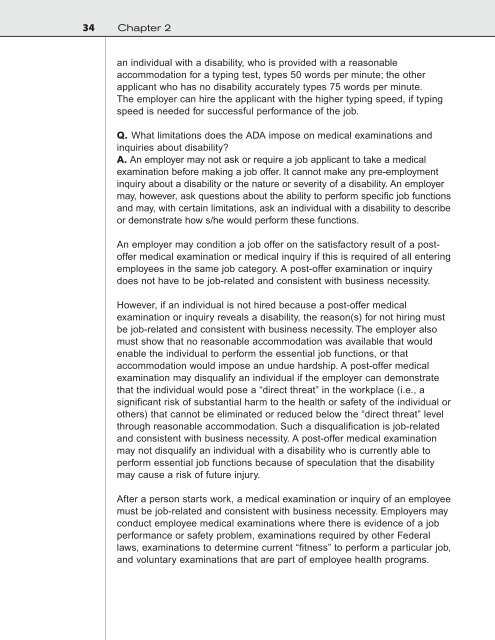Design for Accessibility: A Cultural Administrator's Handbook
Design for Accessibility: A Cultural Administrator's Handbook
Design for Accessibility: A Cultural Administrator's Handbook
Create successful ePaper yourself
Turn your PDF publications into a flip-book with our unique Google optimized e-Paper software.
34 Chapter 2<br />
an individual with a disability, who is provided with a reasonable<br />
accommodation <strong>for</strong> a typing test, types 50 words per minute; the other<br />
applicant who has no disability accurately types 75 words per minute.<br />
The employer can hire the applicant with the higher typing speed, if typing<br />
speed is needed <strong>for</strong> successful per<strong>for</strong>mance of the job.<br />
Q. What limitations does the ADA impose on medical examinations and<br />
inquiries about disability?<br />
A. An employer may not ask or require a job applicant to take a medical<br />
examination be<strong>for</strong>e making a job offer. It cannot make any pre-employment<br />
inquiry about a disability or the nature or severity of a disability. An employer<br />
may, however, ask questions about the ability to per<strong>for</strong>m specific job functions<br />
and may, with certain limitations, ask an individual with a disability to describe<br />
or demonstrate how s/he would per<strong>for</strong>m these functions.<br />
An employer may condition a job offer on the satisfactory result of a postoffer<br />
medical examination or medical inquiry if this is required of all entering<br />
employees in the same job category. A post-offer examination or inquiry<br />
does not have to be job-related and consistent with business necessity.<br />
However, if an individual is not hired because a post-offer medical<br />
examination or inquiry reveals a disability, the reason(s) <strong>for</strong> not hiring must<br />
be job-related and consistent with business necessity. The employer also<br />
must show that no reasonable accommodation was available that would<br />
enable the individual to per<strong>for</strong>m the essential job functions, or that<br />
accommodation would impose an undue hardship. A post-offer medical<br />
examination may disqualify an individual if the employer can demonstrate<br />
that the individual would pose a “direct threat” in the workplace (i.e., a<br />
significant risk of substantial harm to the health or safety of the individual or<br />
others) that cannot be eliminated or reduced below the “direct threat” level<br />
through reasonable accommodation. Such a disqualification is job-related<br />
and consistent with business necessity. A post-offer medical examination<br />
may not disqualify an individual with a disability who is currently able to<br />
per<strong>for</strong>m essential job functions because of speculation that the disability<br />
may cause a risk of future injury.<br />
After a person starts work, a medical examination or inquiry of an employee<br />
must be job-related and consistent with business necessity. Employers may<br />
conduct employee medical examinations where there is evidence of a job<br />
per<strong>for</strong>mance or safety problem, examinations required by other Federal<br />
laws, examinations to determine current “fitness” to per<strong>for</strong>m a particular job,<br />
and voluntary examinations that are part of employee health programs.


